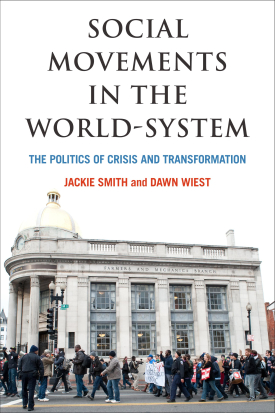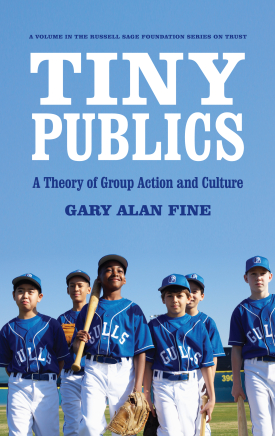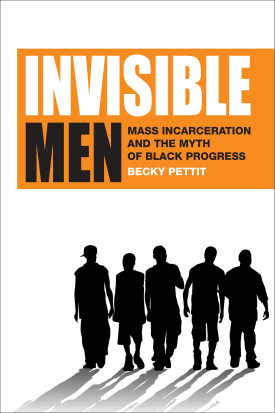According to The Pew Center on the States, unfunded liabilities in state pension systems amounted to nearly half a trillion dollars even before the financial crisis hit in the fall of 2008. The subsequent collapse of the equity markets and the shrinkage in state tax revenues brought on by the recession only made these pension problems worse.
Between 2009 and 2010, the total state and federal prison population declined for the first time since 1972, and the number of individuals in state prisons actually peaked in 2008. At the same time, state and federal corrections expenditures in 2010 decreased for the first time since the mid-1970s. These changes raise a straightforward question: are these reversals in long-term trends a direct response to the post-recession economic climate? Or is something more involved?

Social Movements in the World-System
About This Book
A Volume in the American Sociological Association’s Rose Series in Sociology
Honorable Mention, 2013 Best Book Award, Political Economy of the World-System Section of the American Sociological Association
Honorable Mention, 2013 Best Book Award, Global and Transnational Sociology Section of the American Sociological Association
Global crises such as rising economic inequality, volatile financial markets, and devastating climate change illustrate the defects of a global economic order controlled largely by transnational corporations, wealthy states, and other elites. As the impacts of such crises have intensified, they have generated a new wave of protests extending from the countries of the Middle East and North Africa throughout Europe, North America, and elsewhere. This new surge of resistance builds upon a long history of transnational activism as it extends and develops new tactics for pro-democracy movements acting simultaneously around the world.
In Social Movements in the World-System, Jackie Smith and Dawn Wiest build upon theories of social movements, global institutions, and the political economy of the world-system to uncover how institutions define the opportunities and constraints on social movements, which in turn introduce ideas and models of action that help transform social activism as well as the system itself. Smith and Wiest trace modern social movements to the founding of the United Nations, as well as struggles for decolonization and the rise of national independence movements, showing how these movements have shifted the context in which states and other global actors compete and interact. The book shows how transnational activism since the end of the Cold War, including United Nations global conferences and more recently at World Trade Organization meetings, has shaped the ways groups organize. Global summits and UN conferences have traditionally provided focal points for activists working across borders on a diverse array of issues. By engaging in these international arenas, movements have altered discourses to emphasize norms of human rights and ecological sustainability over territorial sovereignty. Over time, however, activists have developed deeper and more expansive networks and new spaces for activism. This growing pool of transnational activists and organizations democratizes the process of organizing, enables activists to build on previous experiences and share knowledge, and facilitates local actions in support of global change agendas.
As the world faces profound financial and ecological crises, and as the United States' dominance in the world political economy is increasingly challenged, it is especially urgent that scholars, policy analysts, and citizens understand how institutions shape social behavior and the distribution of power. Social Movements in the World-System helps illuminate the contentious and complex interactions between social movements and global institutions and contributes to the search for paths toward a more equitable, sustainable, and democratic world.
JACKIE SMITH is professor of sociology at the University of Pittsburgh.
DAWN WIEST is senior research analyst at the American College of Physicians.
RSF Journal
View Book Series
Sign Up For Our Mailing List
Apply For Funding

Tiny Publics
About This Book
If all politics is local, then so is almost everything else, argues sociologist Gary Alan Fine. We organize our lives by relying on those closest to us—family members, friends, work colleagues, team mates, and other intimates—to create meaning and order. In this thoughtful and wide-ranging book, Fine argues that the basic building blocks of society itself are forged within the boundaries of such small groups, the "tiny publics" necessary for a robust, functioning social order at all levels. Action, meaning, authority, inequality, organization, and institutions all have their roots in small groups. Yet for the past twenty-five years social scientists have tended to ignore the power of groups in favor of an emphasis on organizations, societies, or individuals. Based on over thirty-five years of Fine's own ethnographic research across an array of small groups, Tiny Publics presents a compelling new theory of the pivotal role of small groups in organizing social life.
No social system can thrive without flourishing small groups. They provide havens in an impersonal world, where faceless organizations become humanized. Taking examples from such diverse worlds as Little League baseball teams, restaurant workers, high school debate teams, weather forecasters, and political volunteers, Fine demonstrates how each group has its own unique culture, or idioculture—the system of knowledge, beliefs, behavior, and customs that define and hold a group together. With their dense network of relationships, groups serve as important sources of social and cultural capital for their members. The apparently innocuous jokes, rituals, and nicknames prevalent within Little League baseball teams help establish how teams function internally and how they compete with other teams. Small groups also provide a platform for their members to engage in broader social discourse and a supportive environment to begin effecting change in larger institutions. In his studies of mushroom collectors and high school debate teams, Fine demonstrates the importance of stories that group members tell each other about their successes and frustrations in fostering a strong sense of social cohesion. And Fine shows how the personal commitment political volunteers bring to their efforts is reinforced by the close-knit nature of their work, which in turn has the power to change larger groups and institutions. In this way, the actions and debates begun in small groups can eventually radiate outward to affect every level of society.
Fine convincingly demonstrates how small groups provide fertile ground for the seeds of civic engagement. Outcomes often attributed to large-scale social forces originate within such small-scale domains. Employing rich insights from both sociology and social psychology, as well as vivid examples from a revealing array of real-work groups, Tiny Publics provides a compelling examination of the importance of small groups and of the rich vitality they bring to social life.
GARY ALAN FINE is professor of sociology at Northwestern University.
A Volume in the Russell Sage Foundation Series on Trust
RSF Journal
View Book Series
Sign Up For Our Mailing List
Apply For Funding

Invisible Men
About This Book
For African American men without a high school diploma, being in prison or jail is more common than being employed—a sobering reality that calls into question post-Civil Rights era social gains. Nearly 70 percent of young black men will be imprisoned at some point in their lives, and poor black men with low levels of education make up a disproportionate share of incarcerated Americans. In Invisible Men, sociologist Becky Pettit demonstrates another vexing fact of mass incarceration: most national surveys do not account for prison inmates, a fact that results in a misrepresentation of U.S. political, economic, and social conditions in general and black progress in particular. Invisible Men provides an eye-opening examination of how mass incarceration has concealed decades of racial inequality.
Pettit marshals a wealth of evidence correlating the explosion in prison growth with the disappearance of millions of black men into the American penal system. She shows that, because prison inmates are not included in most survey data, statistics that seemed to indicate a narrowing black-white racial gap—on educational attainment, work force participation, and earnings—instead fail to capture persistent racial, economic, and social disadvantage among African Americans. Federal statistical agencies, including the U.S. Census Bureau, collect surprisingly little information about the incarcerated, and inmates are not included in household samples in national surveys. As a result, these men are invisible to most mainstream social institutions, lawmakers, and nearly all social science research that isn't directly related to crime or criminal justice. Since merely being counted poses such a challenge, inmates' lives—including their family background, the communities they come from, or what happens to them after incarceration—are even more rarely examined. And since correctional budgets provide primarily for housing and monitoring inmates, with little left over for job training or rehabilitation, a large population of young men are not only invisible to society while in prison but also ill-equipped to participate upon release.
Invisible Men provides a vital reality check for social researchers, lawmakers, and anyone who cares about racial equality. The book shows that more than a half century after the first civil rights legislation, the dismal fact of mass incarceration inflicts widespread and enduring damage by undermining the fair allocation of public resources and political representation, by depriving the children of inmates of their parents' economic and emotional participation, and, ultimately, by concealing African American disadvantage from public view.
BECKY PETTIT is professor of sociology at the University of Washington.
Related Events & Media
RSF Journal
View Book Series
Sign Up For Our Mailing List
Apply For Funding
The Great Recession and its aftermath have put enormous fiscal pressures on the American states, which must bear the triple burden of steeply declining tax revenues, exploding costs for social assistance programs, and large investment losses in state pension funds. The aggregate budgetary shortfall experienced by the states amounted to some $430 billion between 2009 and 2011.
Pagination
- Previous page
- Page 29
- Next page
